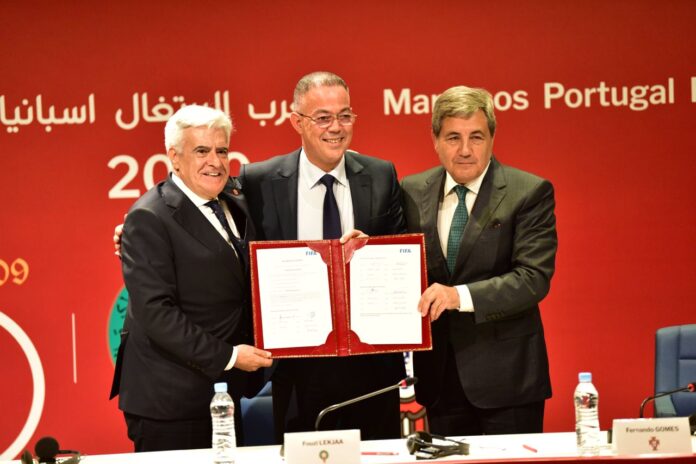The Presidents of the Football Associations of Morocco, Portugal, and Spain convened to formalize their intention to bid for the FIFA World Cup in 2030 and to share their vision for the tournament with a global audience.
With FIFA having officially initiated the bidding process, the three FA Presidents met in person to express their interest in bidding, marking the initial step in FIFA’s bidding process timeline, and commemorated this significant milestone together.
Fouzi Lekjaa, who serves as the President of the Royal Moroccan Football Federation, Fernando Gomes, the President of the Portuguese Football Federation, and Pedro Rocha, President of the Royal Spanish Football Federation, jointly articulated their vision for a tournament that not only upholds the legacy of the FIFA World Cup but also propels the growth of football and leaves a meaningful impact on a global scale.
A century after the inaugural FIFA World Cup, these three nations aspire to harness their distinctive football heritage, rich traditions, and millennia of interconnected cultures and shared history to deliver an inclusive, forward-thinking, and sustainable tournament that embodies the true spirit of celebration. Their plan for the 2030 World Cup envisions it as a compact, accessible, and fan-centric event designed to benefit the entire football ecosystem.
The FIFA World Cup in 2030, hosted by Morocco, Portugal, and Spain, would be an unprecedented men’s World Cup spanning two continents and dedicated to strengthening the bonds between Europe, Africa, and the rest of the world. This cross-continental World Cup presents a unique opportunity to showcase the diversity of football, promote collaboration among nations, and leave a lasting social legacy not only within the three host countries but also on a global scale.
Fouzi Lekjaa, as the President of the Royal Moroccan Football Federation, highlighted the historical significance of this joint bid, emphasizing the shared history and ambitions of these three countries in their quest to host the FIFA World Cup in 2030.
“It is a World Cup that will help us further unite our common civilizations established more than ten centuries ago. The three countries share a common history, a common present, and are looking forward towards a common future. All of this demonstrates, from both shores of the Mediterranean, that collective success is possible and that prosperity can have a shared and collective perspective.”
Fernando Gomes, at the helm of the Portuguese Football Federation, underlined the substantial ambition that comes with the organization of the 2030 FIFA World Cup and highlighted the enduring legacy the three countries aspire to create.
“This is a historic moment because it officially begins our process with FIFA to be able to organize the FIFA World Cup in 2030. This is great occasion for us, and highly symbolic given it will be the centenary of the first ever edition of the tournament. But 2030 will be much more than the celebration of the past! Due to the ambition and competence of our three Federations, we believe this tournament will mark a paradigm shift in how major events are delivered in the future. That is our ambition!”
Pedro Rocha, the President of President of the Royal Spanish Football Federation stressed the unique opportunity for collaboration among different football federations, countries, and people.
“This candidacy is a message of hope and unity because this World Cup will be a demonstration of uniting cultures, and the promotion of inclusion, diversity, and respect. It will be a World Cup with a significant social legacy that will remain in Morocco, Portugal, Spain – and around the world. We have a common project that will create excitement everywhere. Let’s make this dream come true!”
As for the selection of stadiums in the three host countries for the final bid, the three Presidents unanimously concluded that it is premature at this juncture to make any determinations. This is due to the ongoing work of technical teams engaged in studies and assessments.
The subsequent phase in FIFA’s bidding process for the 2030 World Cup entails the three Federations submitting their bidding agreements to FIFA by the close of November 2023.









































